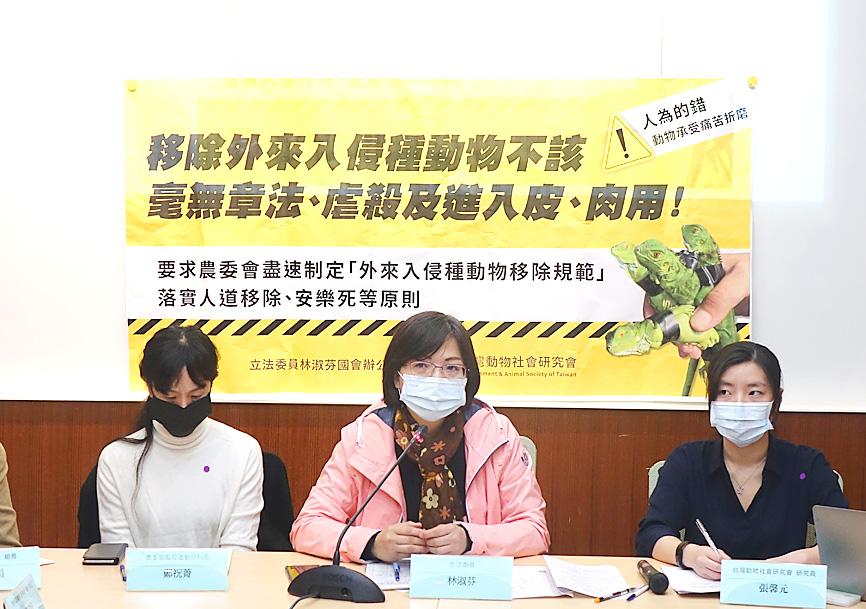Democratic Progressive Party Legislator Lin Shu-fen (林淑芬) yesterday called for regulations on the extermination of invasive species, after images emerged on the Internet showing a man killing a green iguana by placing a firecracker in its mouth.
The images went viral after the Facebook group Baoliao Commune reposted them on Feb. 19, saying that the government’s bid to control the green iguana population by mobilizing local residents has resulted in animal abuse.
The Council of Agriculture’s lax regulations for pet imports is to blame for the nation’s invasive species problem, Lin told a news conference at the Legislative Yuan, which was also attended by members of the Environment and Animal Society of Taiwan.

Photo: Wang Yi-sung, Taipei Times
The government should stop subsidizing citizens for killing or capturing invasive species, and instead devise a policy that utilizes animal control professionals acting under clear guidelines to safely and ethically handle animals, Lin said.
Reports that green iguanas were being consumed as game meat suggest that the unregulated hunting of the animals poses a threat to public health, she said, adding that wild animals could carry zoonotic diseases.
Society representatives said the council urgently needs to create regulations for removing invasive species.
The regulations must state that invasive species should not be abused, that removal should be conducted by qualified professionals, and that the animals should be put down without causing unnecessary pain or suffering, Lin said.
The carcasses of euthanized animals should be disposed of, and should not be used to produce meat or leather products, which could expose the public to diseases, she said.
Forestry Bureau Director of Conservation Lo Yu-chuan (羅尤娟) said the council’s volunteer iguana catchers utilize nets, and have been trained to humanely capture the animals.
A faculty member at the Pingtung University of Science Technology has been appointed to help the county government educate the public on the ethical treatment of animals, she said, adding that the council could also release its internal animal control guidelines for public use.
The council’s Department of Animal Husbandry and Animal Protection Director Cheng Chu-ching (鄭祝菁) said her department has opened investigations into the firecracker incident, and allegations that iguanas were being harvested for meat or hides.
Authorities in several counties have copied the online images as evidence, she said.
People who kill or harm a pet green iguana could face at least one year in prison under Article 25 of the Animal Protection Act (動物保護法), she added.

A preclearance service to facilitate entry for people traveling to select airports in Japan would be available from Thursday next week to Feb. 25 at Taiwan Taoyuan International Airport, Taoyuan International Airport Corp (TIAC) said on Tuesday. The service was first made available to Taiwanese travelers throughout the winter vacation of 2024 and during the Lunar New Year holiday. In addition to flights to the Japanese cities of Hakodate, Asahikawa, Akita, Sendai, Niigata, Okayama, Takamatsu, Kumamoto and Kagoshima, the service would be available to travelers to Kobe and Oita. The service can be accessed by passengers of 15 flight routes operated by

GIVE AND TAKE: Blood demand continues to rise each year, while fewer young donors are available due to the nation’s falling birthrate, a doctor said Blood donors can redeem points earned from donations to obtain limited edition Formosan black bear travel mugs, the Kaohsiung Blood Center said yesterday, as it announced a goal of stocking 20,000 units of blood prior to the Lunar New Year. The last month of the lunar year is National Blood Donation Month, when local centers seek to stockpile blood for use during the Lunar New Year holiday. The blood demand in southern Taiwan — including Tainan and Kaohsiung, as well as Chiayi, Pingtung, Penghu and Taitung counties — is about 2,000 units per day, the center said. The donation campaign aims to boost

ENHANCING EFFICIENCY: The apron can accommodate 16 airplanes overnight at Taoyuan airport while work on the third runway continues, the transport minister said A new temporary overnight parking apron at Taiwan Taoyuan International Airport is to start operating on Friday next week to boost operational efficiency while the third runway is being constructed, the Ministry of Transportation and Communications said yesterday. The apron — one of the crucial projects in the construction of the third runway — can accommodate 16 aircraft overnight at the nation’s largest international airport, Minister of Transportation and Communications Chen Shih-kai (陳世凱) told reporters while inspecting the new facility yesterday morning. Aside from providing the airport operator with greater flexibility in aircraft parking during the third runway construction,

American climber Alex Honnold is to attempt a free climb of Taipei 101 today at 9am, with traffic closures around the skyscraper. To accommodate the climb attempt and filming, the Taipei Department of Transportation said traffic controls would be enforced around the Taipei 101 area. If weather conditions delay the climb, the restrictions would be pushed back to tomorrow. Traffic controls would be in place today from 7am to 11am around the Taipei 101 area, the department said. Songzhi Road would be fully closed in both directions between Songlian Road and Xinyi Road Sec 5, it said, adding that bidirectional traffic controls would